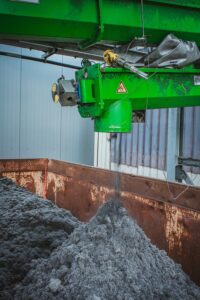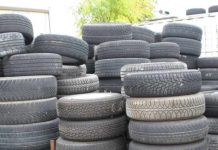Black is everywhere: car tires, cable coatings, printer ink, seals, and flooring materials. Many everyday products owe their color and durability to industrial carbon black. This fine black powder improves stability, abrasion resistance, and UV protection. But producing it from fossil resources generates massive CO₂ emissions — placing a heavy burden on the climate and environment.
Carbon black is composed almost entirely of carbon and is produced through the incomplete combustion of heavy oil or natural gas. Approximately 15 million metric tons are produced globally each year, with more than two-thirds of this amount used in tire manufacturing. Each ton of carbon black results in roughly 2.5 tons of CO₂ emissions. Altogether, global production accounts for tens of millions of tons of greenhouse gases annually.
Without carbon black, tires wouldn’t be black — or nearly as durable. It reinforces the rubber, enhances wear resistance, and extends service life. However, the environmental cost is steep, including the use of fossil-based raw materials, high energy consumption, and a significant carbon footprint.
Recovered carbon black (rCB) — a sustainable alternative
A climate-friendly and sustainable alternative is recovered carbon black (rCB) — a material produced through the thermochemical recycling of end-of-life tires. In advanced pyrolysis facilities, tires are broken down at temperatures of around 500 to 700 °C in an oxygen-free environment. This process yields pyrolysis oil, gas, and a solid carbon residue, which is then refined into high-quality rCB.
The benefits are substantial: up to 80% lower CO₂ emissions compared to conventional carbon black production, and the valuable materials in the tire are returned to the cycle. Waste becomes raw material — a crucial step toward a functioning circular economy.
Where rCB already replaces conventional carbon black
In recent years, recovered carbon black has evolved from a niche innovation into a commercially viable alternative. Depending on the application, rCB can now replace 20% to 100% of fossil-based carbon black. It is already being successfully used in:
Tires (passenger vehicles, trucks, specialty tires) — up to 60% replacement
Rubber flooring and floor coverings — up to 100% rCB
Seals, conveyor belts, vibration dampers — 100%
Plastic and rubber compounds (masterbatch) — 100%
Paints and inks (e.g., printing inks, coatings) — 100%
Sports and leisure products (e.g., tennis ball cores, EVA foams) — 100%
Technical textiles (e.g., fibers, wetsuits, acoustic panels) — 100%
This broad applicability shows that rCB is no longer a future concept — it’s a market-ready, practical substitute with significant environmental benefits.
Real-world applications
A growing number of mid-sized and large industrial companies across Europe are already using recovered carbon black (rCB) to replace fossil-based raw materials and support circularity. Here are several real-world examples:
Schwalbe (Germany): Since 2023, Schwalbe has incorporated recycled carbon black from end-of-life bicycle tires into 70% of its product range — reducing CO₂ emissions by approximately 80% without sacrificing quality or performance. Schwalbe is working with Pyrum Innovations to expand its use of rCB.
Nokian Tyres (Finland): In 2022, this Finnish tire manufacturer introduced rCB into a commercial product line. In February 2024, Nokian announced a long-term supply agreement with a European end-of-life tire recycling joint venture — including Scandinavian
Enviro Systems — to secure rCB supply starting in 2026. This supports the company’s goal of achieving 50% recycled or renewable materials in its tires by 2030.
Michelin (France) – is incorporating rCB into its next-generation tires. For the 100th anniversary of the 24 Hours of Le Mans in 2023, it developed a racing tire made with 63% sustainable materials — including rCB from Enviro’s Swedish recycling plant. This high-performance tire, used on the hydrogen-powered Green GT H24 prototype, marked the first time such a high share of recycled content was used in motorsport. Michelin has committed to manufacturing all tires from 100% sustainable materials by 2050.
Pirelli & C. SpA (Italy): In July 2025, Pirelli launched a mass-produced tire (P Zero for Range Rover) made with more than 70% sustainable content. Alongside bio-based materials, it features „circular carbon black“ derived from pyrolysis oil from used tires. The tire incorporates Pirelli’s recycled carbon black to partially replace conventional carbon black, helping close the loop on resource use. This marks a major step toward sustainable premium tires in the luxury vehicle segment (JLR/Range Rover), with full-scale production starting in 2025.
Continental AG (Germany): Since 2023, Continental has blended recycled carbon black into the rubber compounds of its “Super Elastic” solid tires (used in industrial forklifts and transport vehicles) at its Korbach plant in Hesse. Supplied by Pyrum Innovations, the rCB replaces a portion of virgin carbon black — reducing fossil fuel use and CO₂ emissions. With this 2023 launch, Continental is advancing toward its goal of producing all tires from 100% sustainable materials by 2050.
AnVa Polytech (Sweden): This plastics and rubber supplier has used rCB from end-of-life tires in mass-produced automotive rubber parts since 2016. The recycled carbon black is sourced from local pyrolysis specialist Enviro (Åsensbruk plant). By 2023, more than 200 million components — including suspension buffers and seals — had been produced for major automakers with a significantly reduced carbon footprint. In 2025, AnVa launched its new “climate-neutral” rubber compound, Climarub, made entirely from recycled carbon black — demonstrating that rCB can meet industrial-scale, high-performance demands.
Nexen Tire (Südkorea): In 2025, Nexen signed a long-term supply contract for rCB to serve its production plants in Asia and Europe (Czech Republic).
Conclusion: circularity instead of combustion
Recovered carbon black represents a critical shift toward a truly circular economy. Instead of burning fossil resources, carbon from end-of-life tires is recovered and reused. This reduces CO₂ emissions, conserves valuable resources, and offers industry a viable path toward sustainable production.
About the Allianz Zukunft Reifen (AZuR)

Since 2020, AZuR has been actively advocating across Europe for a sustainable, circular tire economy. End-of-life tires should be reused or recycled as fully as possible — to prevent waste, lower CO₂ emissions, conserve natural resources, and protect both people and the environment.
AZuR brings together more than 90 partners from industry, SMEs, trade, and science, covering all areas of the sustainable tire circular economy — from eco-friendly tire manufacturing and certified collection systems to repair, retreading, and the material or chemical recovery of valuable raw materials from used tires.
Through interdisciplinary collaboration, AZuR develops new solutions for an ecologically and economically viable tire cycle. Universities in the network play a key role by contributing scientifically grounded studies and research to help close material loops.
In November 2025, the Alliance for the Future of Tires received the special “Cooperation” award as part of the first-ever NRW Resource Conservation Award presented by the Efficiency Agency NRW (efa). In September 2025, AZuR received the German Award for Sustainability Projects 2025. In the “Overall Concept — NPO” category, the jury recognized this unique European network in the tire and recycling industry for its comprehensive and practical approach to climate-friendly tire circularity.
AZuR network coordinator Christina Guth was presented with the Recircle Award 2025 in the Women’s Award for the Tyre Retreading Sector category. In November 2023, AZuR received the ‘European Transport Award for Sustainability 2024’ for its life cycle assessment study on tire retreading.
The AZuR success model for tire circularity is gaining international recognition — and is intended to serve as a transferable model for other industries and waste streams. You can find out more about AZuR here: https://azur-netzwerk.de
Source: Allianz Zukunft Reifen (AZuR)





